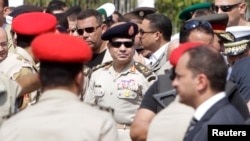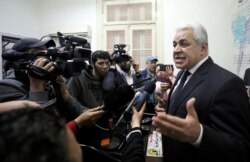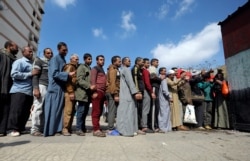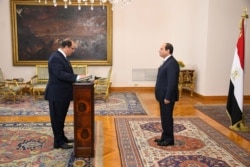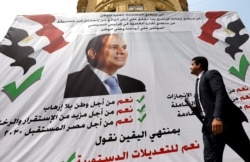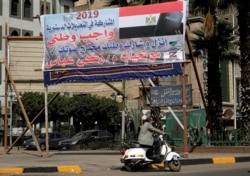This spring, as Egypt’s parliament debated handing President Abdel Fatah el-Sissi greater power and allowing him to govern until 2030, speaker Ali Abdelaal declared the proposals were the will of the nation’s legislature. The ideas, he said, were “born in parliament, and the president has nothing to do with them, from near or far.”
The reality was different, said five people with knowledge of the matter.
Three of Sissi’s close advisers, including his eldest son, Mahmoud, had begun planning the changes to the constitution several months earlier, soon after Sissi was elected to a second and final term in office in April 2018, according to these sources, one of whom was present at the discussions.
In meetings in September and October 2018 at the headquarters of Egypt’s General Intelligence Service in Cairo, Mahmoud el-Sissi, intelligence chief Abbas Kamel and Mohamed Abou Shoka, a legal adviser to Sissi’s election campaign, talked through ideas for prolonging the president’s time in office, the sources said. They discussed which articles of the constitution to rewrite, how to do this and the timing of such a move.
The proposals that emerged – extending Sissi’s presidency and his power over the courts and parliament – were put before parliament by pro-Sissi lawmakers in February. The draft amendments raced through a chamber dominated by Sissi loyalists, and were approved in a referendum in April, in which critical voices were largely silent. Sissi’s opponents say the revisions to the constitution extinguish all hope for a civil, democratic and modern state. Not since the decades-long rule of Hosni Mubarak ended in 2011, they say, has so much power been concentrated in the hands of one man.
“The tyrant regime is legitimized,” said Hamdeen Sabahi, a former presidential candidate and a senior member of the Civil Democratic Movement, an alliance of opposition groups.
The Egyptian government did not respond to detailed questions from Reuters for this article. Sissi has said previously that Egypt is besieged by terrorism. Supporters of the constitutional changes argue that Sissi still has work to do in that fight and in reforming Egypt’s economy, and so he needs more time and extended powers.
Parliamentary speaker Abdelaal told parliament last month that Sissi “has a dream to make this country strong, advanced and developed.”
Sissi, a former general, became president in 2014 after the military, led by him, toppled Mubarak’s first democratically elected civilian successor, Mohamed Morsi of the Muslim Brotherhood, following weeks of street protests. Since then, Sissi has steadily tightened his grip. A crackdown on opponents has drawn criticism from human rights groups and Western governments. A Reuters investigation in April found that Egyptian police had shot dead hundreds of suspected Islamist militants in what authorities said were gun battles, but bereaved families said were extrajudicial killings. A Reuters investigation in July showed a threefold rise in the number of death penalties carried out since Sissi came to power.
In interviews, lawmakers, security sources and people with links to Egyptian intelligence described how Sissi’s supporters rewrote key passages of the constitution to give the president and the military greater power, then pushed the changes through a pliant parliament and the public vote. One of Egypt’s few independent news outlets, Mada Masr, first reported that Sissi’s son and intelligence chief Abbas Kamel attended talks about changing the constitution. Reuters pieced together more details about the discussions and how lawmakers and the media were brought into line.
A person familiar with the parliamentary process said lawmakers had no hand in drawing up the draft amendments that were put before the house. Some lawmakers who opposed the changes – they were approved by 531 votes to 22 – said they were subject to smears and intimidation.
Senior judges wrote to parliament, in a March 16 letter that was reviewed by Reuters, warning that the amendments “would impinge on the independence of the judiciary.” Opposition politicians said there were dozens of arrests in the run-up to the referendum.
Softly, softly
The three Sissi advisers who met in September and October generally work behind the scenes.
Sissi’s son Mahmoud rarely appears in public. A graduate of Egypt’s military academy, he holds a senior position in the General Intelligence Service, according to two sources with close links to Egyptian intelligence. A Western diplomat said Mahmoud is in charge of national security, one of three sons of the president known to hold official positions.
Abbas Kamal, nicknamed ‘the president’s shadow’ because of his closeness to Sissi, became head of the General Intelligence Service in June 2018, having previously served as Sissi’s chief of staff. Mohamed Abou Shoka, a former chief prosecutor, acted as spokesman and legal adviser for Sissi’s 2018 presidential campaign.
The reshaped constitution that they helped to craft expanded presidential and military powers. It made the president responsible for appointing chief judges and the public prosecutor, and selecting one-third of deputies in a new parliamentary chamber, the Council of Senators. It tasked the military with protecting “the constitution and democracy and the fundamental makeup of the country and its civil nature,” giving it latitude to step in if it deems Egypt is going in the wrong direction.
The president’s term was increased to six years from four. A special clause said that Sissi's current period in office, which began in 2018, will run to 2024 and he is allowed to stand for election a third time, overriding a ban on more than two consecutive terms.
These last revisions were complicated by a legal requirement that any change to the presidential term must bring with it greater freedoms. By stipulating that at least 25 percent of lawmakers must be women, the amended constitution sought to satisfy that rule.
Timothy Kaldas, a non-resident fellow at the Tahrir Institute for Middle East Policy, a pro-democracy think tank, said the Egyptian government had tried to sell the changes as “some normal constitutional housekeeping and sweeping the extension of his presidency as just a small part of a package of improvements to the constitution.”
Sissi’s advisers were keen to win approval for the changes before fuel price rises in the summer, diplomats and opposition figures said. Egyptians are feeling the strain from higher sales taxes, reduced fuel subsidies and a weak currency – all part of an economic reform program backed by the International Monetary Fund. And while the economy has steadied, Sissi’s popularity has suffered. Egypt's official statistics agency reported in July that one in three Egyptians is living in poverty.
Swift passage
When parliament’s legislative committee presented the draft amendments to the house in February, it said the proposals had the support of 155 lawmakers. But a source familiar with the process said these lawmakers hadn’t been involved in drawing up the amendments. They had simply put their signatures to a pre-written document. In a departure from normal procedure, the names of these signatories were not disclosed to the house, according to three lawmakers. The government did not respond to requests for comment.
In the weeks that followed, parliament held consultations about the proposed constitutional amendments involving representatives of civil society and some opposition leaders. Speaker Abdelaal said the hearings allowed for a free airing of views on the planned changes. Opponents disagreed with this account. “There wasn't a real dialogue,” said Mohamed Sami, leader of the leftist Karam Party.
Members of the judiciary, which sees its powers diminished, pleaded for a rethink. The State Council Judges’ Club, which represents about 3,000 judges, wrote to parliament to warn that amendments would “impinge on the independence of the judiciary in general and reduce the role of the State Council,” a body that rules in administrative disputes and reviews state contracts.
“Justice is the basis of governing, the independence of the judiciary is the basis of justice, and without justice the state will be undermined,” wrote the club’s president, Samir al-Bahay, in the letter, which was reviewed by Reuters. Reuters couldn’t reach al-Bahay for comment.
One judge described the situation as worse for the judiciary than under Gamal Abdel Nasser, Egypt’s authoritarian president from 1954 to 1970. “Nasser used to sack judges, not put them under full control like is happening now,” he said.
Some lawmakers who voted against the changes described being subject to smear campaigns and intimidation. Activists, including some living abroad, said they and their families came under increased pressure.
Lawmaker Khaled Youssef, who is also a prominent film director, said online attacks against him started “as soon as I announced that the regime was making a mistake.” In February, after Youssef spoke out against changing the constitution, video surfaced on the internet purporting to show him and several women engaged in sexual acts. The same video had appeared in 2016 after Youssef opposed Sissi’s decision to hand two Red Sea islands to Saudi Arabia. Youssef said the video was fake.
“Every time I oppose a law ... they start publishing these videos,” said Youssef, who is currently in Paris.
Arrests and silence
In early April, even before the proposed amendments had passed through parliament, roads in Cairo were festooned with banners, posters and digital displays urging people to take part in the yet-to-be-called referendum. Some advertisements went further, pushing for a “yes” vote.
More than 120 opposition figures were arrested before and during the April 20-22 referendum, according to the Civil Democratic Movement, a coalition of opposition parties. Among them was Amir Eissa, a senior member of Al Dostour, a liberal party. Eissa’s brother, Moataz, and the party’s lawyer told Reuters that Eissa was arrested outside a polling station in Al Qalyubia Governorate, north of Cairo, on the second day of voting, after telling the official in charge that he had seen people offering bribes to voters. Reuters wasn’t able to contact the official.
Eissa remains in custody, said the lawyer, who declined to be identified. Prosecutors ordered that he should be detained on charges of joining a terrorist group and using social media to commit crimes that would threaten peace and security, the lawyer added. Egyptian authorities didn’t respond to requests for comment.
Criticism in Egyptian media was muted.
Mohamed Abdel Hafiz, a board member of the Journalists’ Syndicate, a professional body, said articles opposing the amendments were stopped by government censors stationed at printing houses to check newspapers pre-publication.
“Newspapers were prevented from publishing any views that opposed the constitutional amendments,” said Abdel Hafiz.
A website collecting signatures against the referendum was blocked hours after the site’s launch in March, according to NetBlocks, an internet monitoring group. It was unclear who was behind the move. The site had already gathered 60,000 signatures.
On April 24, Egypt’s election commission announced that 89 percent of voters had backed the amendments on a turnout of 44 percent. The commission declared it a free and fair vote.




